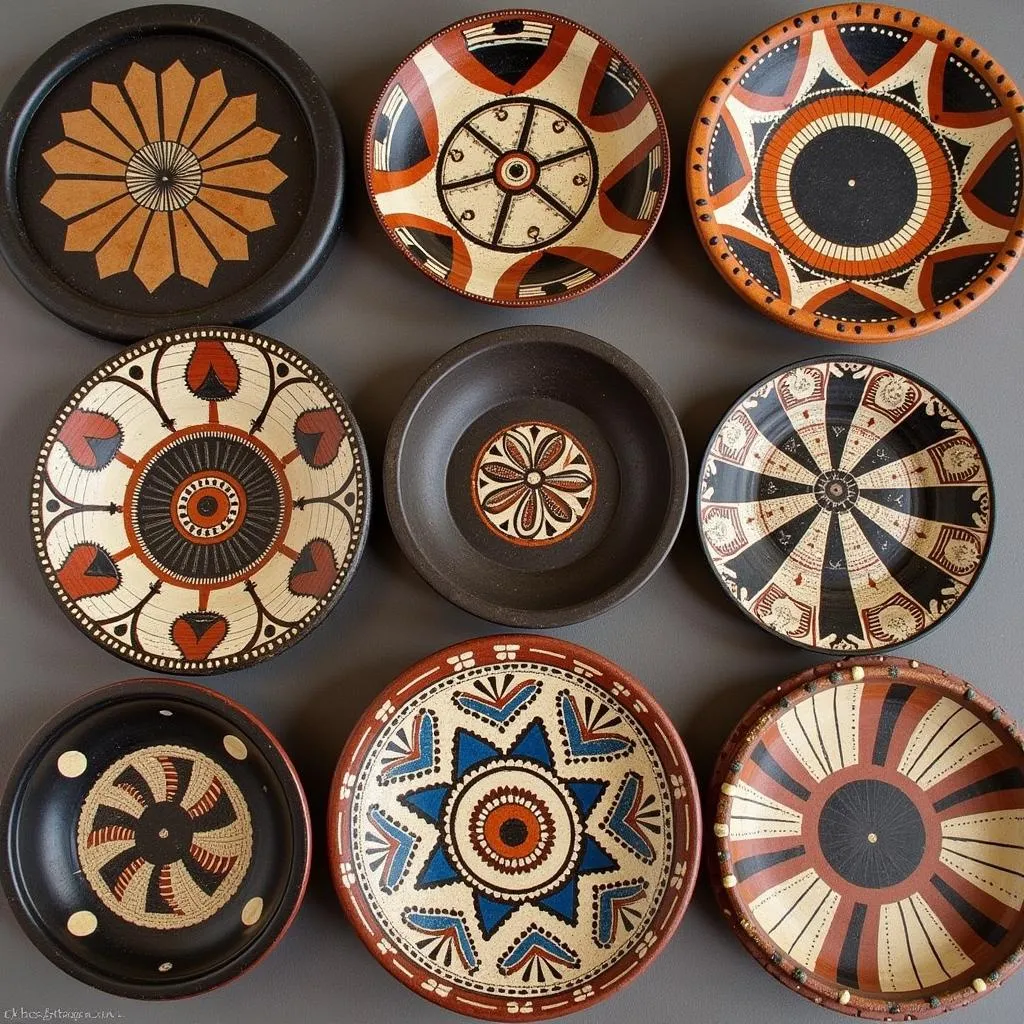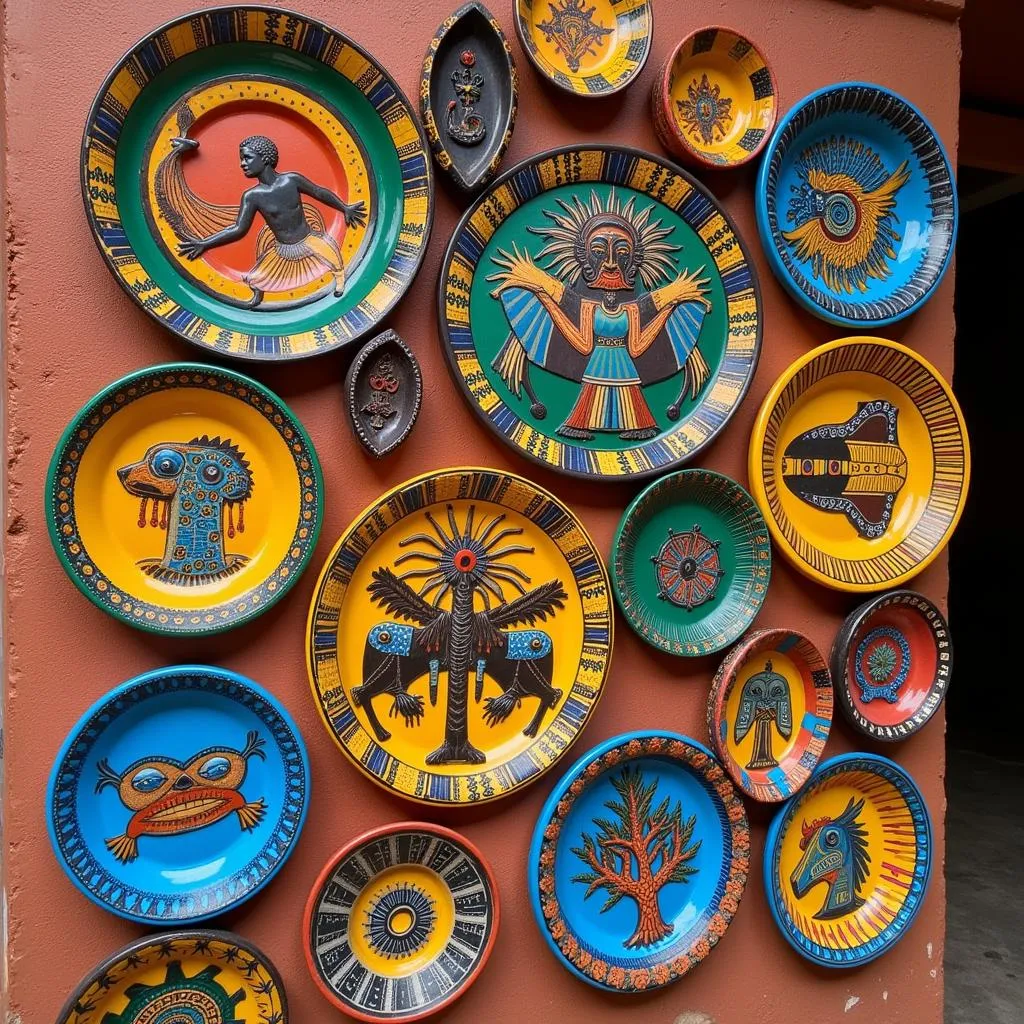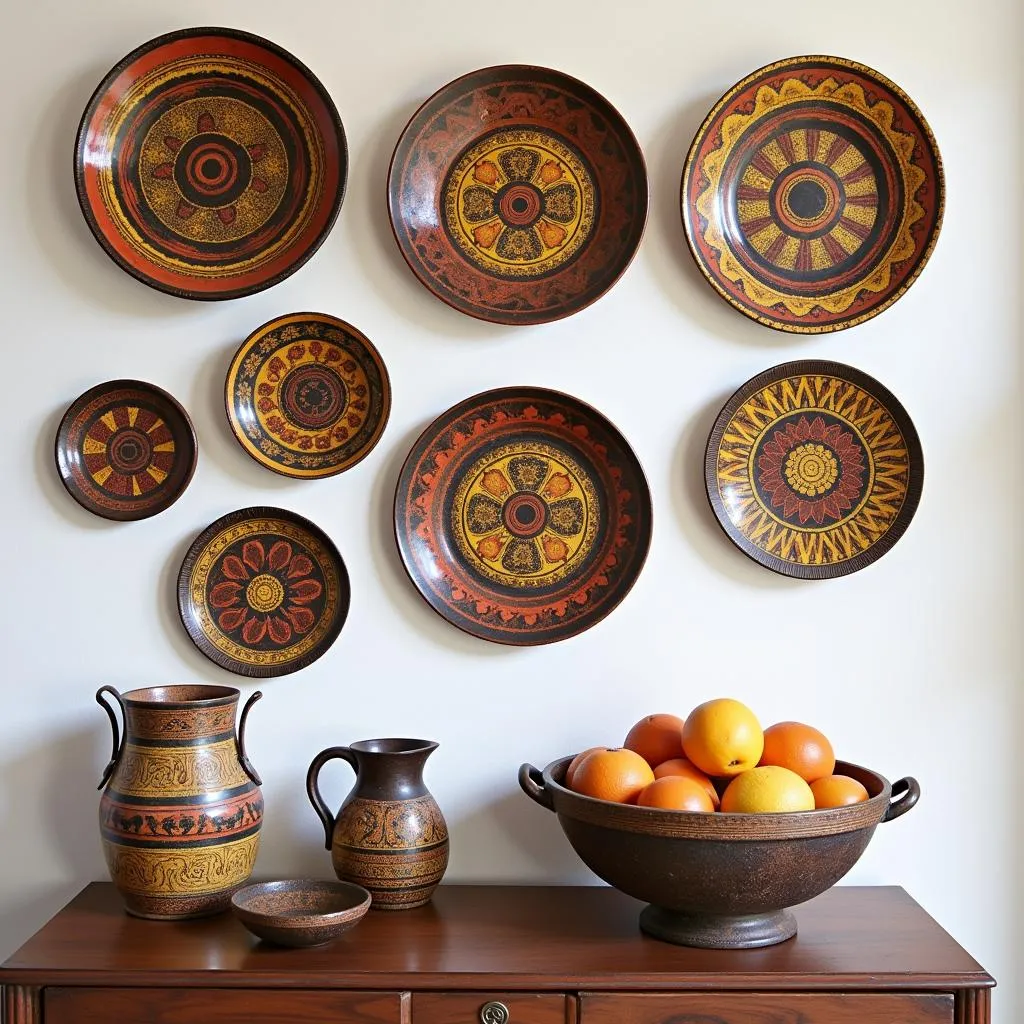African Decorative Plates: A Journey Through Culture and Craftsmanship
African Decorative Plates are more than just tableware; they’re vibrant expressions of culture, history, and artistic mastery. From intricate patterns to bold colors, these plates offer a glimpse into the diverse traditions and stories of the African continent.
 Variety of African Decorative Plates
Variety of African Decorative Plates
The Significance of Plates in African Culture
In many African societies, plates hold a deeper meaning beyond their practical use. They are often seen as symbols of hospitality, community, and shared meals. Large, elaborately decorated plates are commonly used for communal dining, reflecting the importance of togetherness and shared experiences.
These plates are also frequently integrated into ceremonies and rituals. They might be used to serve special foods during festivals, displayed as part of traditional ceremonies, or even given as treasured gifts for weddings and other significant life events.
Exploring Regional Styles and Materials
Each region in Africa boasts its own unique style of decorative plates, shaped by local resources, cultural aesthetics, and ancestral techniques.
North Africa
North African decorative plates, such as those from Morocco, are renowned for their intricate geometric patterns and vibrant colors. These plates often feature traditional Islamic art influences, with motifs like arabesques and calligraphy. The use of vibrant tiles and ceramics is another characteristic of this region.
West Africa
West African countries like Ghana and Nigeria are known for their bold and colorful plates, often made from wood or metal. These plates may feature symbolic representations of animals, ancestral spirits, or everyday life. The Ashanti people of Ghana, for example, are famous for their exquisitely crafted brass trays, often used for ceremonial purposes.
 West African Decorative Plates on Display
West African Decorative Plates on Display
East Africa
East African decorative plates, like those from Kenya and Tanzania, frequently showcase the region’s rich wildlife. Plates might be adorned with images of elephants, giraffes, or lions, often crafted from materials like wood, soapstone, or ceramic. The Maasai people of Kenya and Tanzania are particularly known for their beaded plates, which feature intricate beadwork in vibrant patterns and colors.
Southern Africa
In Southern Africa, countries like South Africa and Zimbabwe have a strong tradition of pottery. Decorative plates from this region often showcase the skills of local artisans, with hand-painted designs and unique glazing techniques. The Ndebele people of South Africa are celebrated for their brightly painted homes and their pottery often reflects similar geometric patterns and vivid hues.
African Decorative Plates in Modern Design
Today, African decorative plates are experiencing a surge in popularity as statement pieces in interior design. Their unique beauty and cultural significance add character and global flair to homes and spaces around the world.
From minimalist designs to bold and colorful creations, there’s an African decorative plate to suit every taste. These plates can be displayed on walls, shelves, or used as centerpieces, bringing a touch of African artistry and heritage into modern interiors.
Choosing and Caring for Your African Decorative Plates
When selecting African decorative plates, it’s essential to consider your personal style and the overall aesthetic of your space.
- For a cohesive look: Choose plates from a specific region or with a consistent color palette.
- To create a focal point: Opt for a large statement plate or a collection of smaller plates with a common theme.
- To add a touch of cultural flair: Look for plates with traditional designs or materials that represent a particular African culture.
Proper care will ensure that your African decorative plates remain beautiful for years to come:
- Dust regularly: Use a soft, dry cloth to remove dust and debris.
- Avoid harsh cleaners: Use a mild soap and water solution for occasional cleaning, avoiding abrasive materials.
- Handle with care: African decorative plates can be fragile, so handle them with care to prevent breakage.
Conclusion
African decorative plates are more than just objects; they are tangible links to rich cultural heritage, artistic innovation, and the enduring spirit of the African continent. By bringing these beautiful pieces into your home, you can celebrate the diversity and beauty of African culture while adding a touch of unique style to your surroundings.
FAQ
-
What are African decorative plates typically made of?
African decorative plates are crafted from a variety of materials, including wood, metal (such as brass or bronze), ceramic, clay, soapstone, and even beads. -
Are African decorative plates expensive?
The price of African decorative plates varies depending on the materials used, the intricacy of the design, and the artist’s reputation. You can find affordable options as well as high-end, collector’s items. -
Where can I buy authentic African decorative plates?
You can purchase authentic African decorative plates from reputable online retailers, fair trade organizations, or specialty stores specializing in African art and crafts.
 African Decorative Plate Wall Display
African Decorative Plate Wall Display
-
Can I use African decorative plates for serving food?
While some African decorative plates are food-safe, it’s essential to check with the seller or artist to confirm. Many decorative plates are intended for display purposes only. -
What is the best way to clean African decorative plates?
Most African decorative plates can be cleaned with a soft, dry cloth for dusting. For more thorough cleaning, use a mild soap and water solution, avoiding any harsh chemicals or abrasive materials.
Explore More African Art
Interested in discovering more about African art and design? Explore these related topics:
- African American Decorative Plates
- African Breastplate
- African Art Stencils
- African Home Accessories
- African Art Activities for Presc
For any inquiries or assistance, please contact us:
Phone: +255768904061
Email: [email protected]
Address: Mbarali DC Mawindi, Kangaga, Tanzania
Our dedicated customer support team is available 24/7 to assist you.
